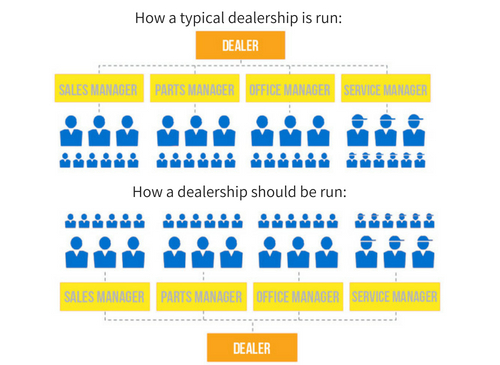Recently our company won a “Special Award for Managers” from Energage as part of their annual Top Workplaces program. The award made me think about how important a management team is to a company’s overall success.
Sometimes managing your managers can be trickier than managing an entire department full of employees. That’s because managers tend to have strong skill sets, personalities, opinions and even different management styles that might conflict.
As a leader, it’s your job to coach and train your managers to be successful while keeping them true to the company’s stated vision and core values. I thought I’d share some of the methods that I have learned and developed over the years to help keep our management team working in unison while directly contributing to our company’s top priority, which is to keep our employees and customers happy.
Hold a Monthly Lunch-and-Learn
All of your managers possess a special skill or area of expertise. Host a monthly lunch meeting so your managers can teach, learn from and be inspired by each other. Think of it as a 20 Group for managers.
Every month, ask a different manager to present on a topic of their choosing that’s management-related, but not on a topic that would be specific to their department.
Example topics might be how to conduct job interviews, tips for motivating team members, team-building exercises or how to deal with difficult employees.
A presentation requires thought, research and preparation, so this is a great learning tool for the individual presenting, as well as their fellow managers in the audience.
Don’t Promote Star Performers Unless They Have Management Qualities
Promoting from within is always a good idea, but be careful who you promote. If you’ve got a star performer who’s chomping at the bit to get to management, be sure to evaluate whether that person has the necessary skills and qualities to be a good manager.
Sometimes the very skills that make someone a great salesperson, such as confidence, resilience and productivity, can interfere with their abilities to be a good manager. Make sure that all your managers work well as part of a team and know how to train and coach less confident team members to success.
If your star performer doesn’t have these skills, that doesn’t mean you shouldn’t promote them. Like other skills, management skills can be learned. Share your concerns, and if the person can acknowledge their shortcomings and commit to improving them, coach and motivate them to becoming a good manager. Then, by all means, promote them.
Prioritize Your Managers’ Priorities
One of the most common assumptions managers make is that the employees in their department work for them. The philosophy behind this thinking is something like, “My employees work under me and their job is to help me be successful.”
Nothing could be further from the truth.
The primary job of a manager is to ensure that their employees have the tools and knowledge that they need to do their jobs successfully. Every day your managers should ask, “What do I need to do to make my employees’ job easier?” Your managers work for your employees, so hold them accountable.

Care About Your Employees
How well do you know the employees that directly report to you? Sure, you know their names, skills and personalities. But how much do you know about them personally?
According to Top Workplaces, the most important factor that contributes to employee happiness is their perception about whether management cares about them. It’s difficult to care about someone you don’t really know.
Get to know your employees and what their hobbies and goals are. What are their spouse and kids’ names; what schools do their kids go to? What is your employee’s biggest personal challenge at home? Is anything causing them stress?
One way to get to know your employees is to have a manager take out a group of two or three employees for a “manager’s lunch” every month. The goal of the lunch is not to address work concerns, but to get to know each other on a personal level. Department team-building exercises can accomplish the same thing.
Create an Open-Door Policy
If you don’t already have an open-door policy, seriously think about creating one. With an open-door policy, any employee with a problem can go to any manager in your organization. It doesn’t have to be their direct manager because the problem might involve a conflict between them.
However, if you adopt this policy, make sure that the employee’s privacy is protected and ensure that there’s no backlash from the employee’s manager if — for some reason — they find out and aren’t happy about it.
An employee might elect to talk to a manager outside of their department for a number of reasons; perhaps they have a rapport with a certain manager, or they brought up an idea to their own manager that the manager dismissed and they want to run it by someone else.
View these occurrences as opportunities, not betrayals. If an employee doesn’t feel comfortable addressing their own manager about something, there’s either a problem or a personality conflict, and in either case, wouldn’t you want to know about it?
What are your tips for creating a star management team?
Mike Esposito














